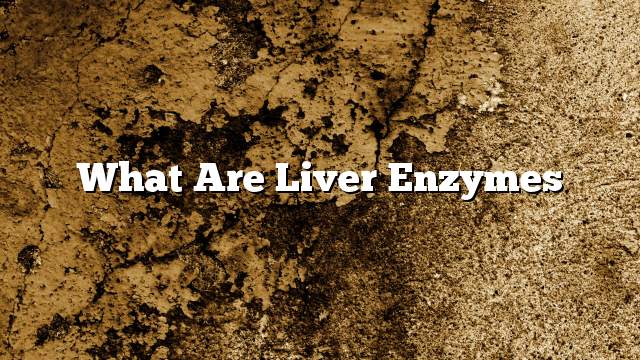Liver
Liver is the largest internal organ in the human body. It weighs about 1500 grams. It is located under the thorax in the right part of the abdominal cavity. Its color tends to brown red. It is mainly composed of two parts: the left and right parts, , With parts of the pancreas and intestines, and the function of the liver integrated with these members in the process of digestion and absorption of nutrients, as well as the liver filter the blood that is returned from the digestive tract, and the liver manufactures the coagulation factors needed by the body to stop bleeding, and also purifies blood from chemicals And drug residues It is addressed by man.
Liver enzymes
Enzyme is a protein whose function is to stimulate and regulate the chemical reactions that occur in the cells of the body to perform various biological functions without causing any change. The enzyme has many enzymes, including the following:
Alanine transporter
The enzyme alanine is an enzyme in the liver, written in the abbreviation (ALT), and naturally there is a small amount of this enzyme in the blood, it should be noted that doctors are interested in knowing the level of this enzyme in the blood to detect the existence of any diseases in the Liver, and to monitor the progression of liver diseases along with the level of other enzymes secreted by the liver, and the natural values of this enzyme range from 7 to 55 units per liter.
Aspartate Carbide Enzyme
The liver excretes the aspartate transaminase (AST) mainly, and the kidneys, heart, muscles, and brain secret a small amount of it. In fact, there is a small amount of this enzyme in the blood. But this enzyme alone does not confirm the presence of a problem in the liver. The problem may be in another organ that secrete this enzyme. Therefore, liver function tests depend on monitoring the levels of several enzymes produced by the liver to be the results of the tests. True and accurate, it should be noted that the values are Selling this enzyme ranging between 8 and 48 units per liter.
Alkaline phosphatase enzyme
The liver is the primary organ that secrete alkaline phosphatase (ALP), and other organs that secrete the enzyme intestine, bone, pancreas, and kidneys. The placenta in pregnant women excretes it, and the doctor measures the level The alkaline phosphatase enzyme when a liver, gallbladder or bone problem is suspected. The normal levels of this enzyme should be between 45 and 115 units per liter. It is worth mentioning that the high levels of this enzyme in children and adolescents within reasonable limits is normal because bones T The growth in this age group, as well as in the pregnant woman, which excretes this enzyme, but its rise in other groups may be evidence of liver disease, blockage of the bile ducts, And low levels of this enzyme may be observed after blood transfusions, Coronary Artery Bypass Surgery or Malnutrition, or zinc deficiency (in English) : Zinc Deficiency, or Wilson’s disease.
Gamma glutamate peptide transporter enzyme
The liver mainly secretes the gamma-glutamyl transpeptidase (GGT) enzyme along with other organs in the body such as the calf, spleen, pancreas, and kidneys. The function of this enzyme is to transport certain molecules in the body, The importance of knowing the proportion of this enzyme in the body in case of suspected liver problem, which is the most tests of liver function, which relies on the result to detect the existence of a problem in the liver, especially if the causative is alcoholic addiction Or poisonous substances Yeh, it should be noted that the natural proportions of this enzyme ranging between 9 and 48 units per liter.
Check liver function
When a person suffers from liver disease, the levels of bilirubin, enzymes and proteins produced by the liver are altered. The levels of aminotransferase, aspartate, and phosphatase Alkali, albumin protein, and bilirubin to detect a liver problem, and the problems and diseases that the doctor asks for liver function testing to detect its presence include:
- Liver Cirrhosis.
- Hepatitis.
- Liver disorders and diseases, to monitor or improve the progress of the condition.
- Patients taking medications that affect liver function.
How to check liver function
The examination of liver function is a normal blood test where a blood sample is taken by the laboratory specialist after cleaning the skin where the needle is with sterile alcohol. The pressure is then applied by a rubber piece on the arm to show the arm veins clearly and select a prominent vein. , And then cotton and medical adhesives are placed where needle stitches are placed, and blood samples are sent to the laboratory for analysis.
Symptoms of liver disorders
The patient suffering from liver disorders of several symptoms and signs of disease, including the following:
- Jaundice (jaundice), which means yellowing of the skin.
- Fatigue and lack of body energy.
- Nausea.
- Vomitting.
- Anorexia.
- Tummy ache.
- The urine color changes to become darker.
- Change the color of the stool to become lighter.
- Itching.
